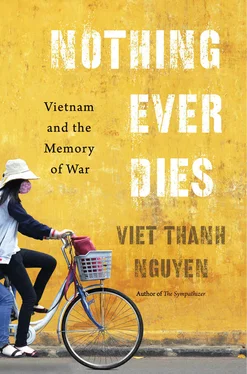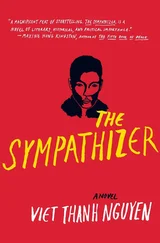We learn to develop habits of recognition and to see strangers as kin, oftentimes by creating sites of communal identity where the sight of others, as our own, is affirmed. What makes the ethics of recalling others explicitly political is that it goes against the grain of the natural and by doing so becomes visible. In contrast, the ethics of remembering one’s own is implicitly political, for it has the luxury of appearing to be natural and hence invisible. As Ricoeur says with considerable irony, “it is always the other who stoops to ideology,” which is the “guardian of identity.” 18He is implying that those with the power to define themselves in relation to others have the privilege of believing that they themselves have neither identities nor ideologies, neither biases nor politics. These worldly matters are left to others, the ones stuck in the muck of their small concerns and their provincial territories, their bodies not inherently dark but rather darkened by the shadow cast by the tower in which the powerful reside. These powerful believe themselves to be impartial, unbiased, fair, objective, and universal, and do not like to be reminded that they are not, or that their power depends on creating and targeting others. So it is that when someone calls on her people to remember others, she identifies herself — she stands out — by committing a political act. Asking her own side to remember others, she risks being called a traitor. At best, those of her own side may call her a cosmopolitan, with the pejorative connotation that she may be a citizen of the world but not of her own nation.
Not coincidentally, the charge of treachery is often leveled most viciously at women, the ones who are supposed to bear within them both the future and the past of the nation, embodied in its children and its culture. 19Take, for example, the Vietnamese author Duong Thu Huong, war veteran and one time member of the Communist Party. Her disillusionment with the Communist Party in the years after its revolutionary victory shaped her fiction, beginning with The Paradise of the Blind . In this novel, she examined the notorious land reforms of the 1950s, when the party sought to redistribute land from landowners to peasants and encouraged peasants to denounce landowners. The excesses led to the execution of even minor landowners and innocent peasants, targeted by their fellow peasants and zealous cadres. Thousands died and Ho Chi Minh apologized. 20Huong’s denunciation of the party grew more strident and more contemporary in Novel without a Name , where she calls the party cadres of the postwar years “little yellow despots.” 21Their “blindness gave them extraordinary energy,” 22but the “herds of dreamy, militant sheep” that followed them deserved some blame. 23The novel is also notable for its evocation of Vietnam’s imperialist history, its long march south to escape Chinese influence and to occupy the lands of numerous tribes and nations, including Cambodians and Cham. The hero of her novel visits the land of the Cham and dreams of his ancestor who had fled from the “barbarians from the north” who “hunted you down. You bore arms against those who lived in the south. It was an unending circle of crimes … history is enmired in crime.” 24The party denounced her, censored her, and placed her under house arrest for committing the crime of remembering those whom the party considered to be others. Even worse, she remembered people of her own side as having committed crimes. But while the party considered her a traitor, Western publishers and readers considered her to be a dissident who spoke for justice, a heroic author who could not be contained by communism’s provincial ideology. Banned at home, her novels were published abroad, for the West likes to translate the enemies of its enemies.
Duong Thu Huong’s case exemplifies the troubling, threatening, and seemingly unnatural quality of remembering others. She shows how one can be denounced by one’s own while being praised by others for the same exact act of recall. Neither denunciation nor praise is innocent, because both emerge from the ideologies of one side or the other. Both sides — if there happen to be only two — prefer to see themselves as being without ideology, with the other side guilty of playing politics, as if politics was a dirty word. A laundering of these dirty politics occurs in the move from remembering others to remembering others as our own. “We” can be said once again, without remembering that those included in the “we” fought each other at one point. This is the hope expressed in a statue such as that of the three soldiers, with its portrait of benevolent solidarity, a hope already dashed by Martin Luther King Jr. in his demand that Americans recognize the brutal solidarity of these men, arrayed against those Vietnamese others who are invisible at the site of the Vietnam Veterans Memorial. The scholar Paul Fussell also wanted to jar his fellow Americans from the comfort of remembering only their own. As he wrote about the Great War and modern memory, a war sixty years in his past, what he saw was that
my American readers had also experienced in Vietnam their own terrible and apparently pointless war of attrition, which made body counts a household phrase.… I hoped that the effect of the book on such readers might persuade them that even Gooks had feelings, that even they hated to die, and like us called for help or God or Mother when their agony became unbearable. 25
Was I not one of these others to whom Fussell gives the proper name of the Gook and yet does not name properly? If so, then I can say it is true: Gooks do have feelings.
As a Gook, in the eyes of some, I can testify that being remembered as the other is a dismembering experience, what we can call a disremembering. Disremembering is not simply the failure to remember. Disremembering is the unethical and paradoxical mode of forgetting at the same time as remembering, or, from the perspective of the other who is disremembered, of being simultaneously seen and not seen. Disremembering allows someone to see right through the other , an experience rendered so memorably by Ralph Ellison in the opening pages of Invisible Man . His narrator, the titular hero, runs into a white man who refuses to see him, and enraged, strikes back to force the white man to see him. Even beaten, however, the white man refuses to see him the way he wishes to be seen. That is because the other’s use of physical force may make the other visible, but only to turn him into a target. If the other wishes to transform ways of seeing, then the other must deploy the psychic forces of remembering, imagining, and narrating as well. Not satisfied with being disremembered, we who are others find that it is up to us to remember ourselves. Having carried ourselves over, or been brought over, from the other side — we Gooks, we goo-goos, we slopes, we dinks, we zipperheads, we slant-eyes, we yellow ones, we brown ones, we Japs, we Chinks, we ragheads, we sand niggers, we Orientals, we who cannot be distinguished between ourselves because we all look alike — we know that the condition of our being and our self-representation is that we are both ourselves and others. We are never without identity and never without ideology, whether we like it or not, whether we acknowledge it or not. Those people who believe themselves to be beyond identity and ideology will, sooner or later, charge us with identity and ideology if we dare to commit that most unnatural act of speaking up and out.
Thus, even though no one has called me, to my face, Gook or any of its equivalents, I know that that epithet exists to be aimed at me. No one had to call me that name, because American culture had already done so through the discourse of the Gook, myself as other struck by the slurs hurled from the airwaves of pop culture. My realization of my racialization, the first sting of a nervous condition untreatable by any type of medicine or surgery, except for the mnemonic kind, arrived early in my adolescence, through jarring encounters with fictions, with other people’s memories. At much too young an age, my preteen self read Larry Heinemann’s Close Quarters (1977) and watched Apocalypse Now (1979). I have never forgotten the scene in Close Quarters where American soldiers gang rape a toothless Vietnamese prostitute, holding a gun to her head and giving her the choice of either blowing them all or being blown away. “After that, Claymore Face didn’t come around much, and nobody much cared.” 26Nor did I ever forget the moment in Apocalypse Now when American sailors massacre a sampan full of civilians, the coup de grace delivered by Captain Willard when he executes the sole survivor — also a woman, since the Vietnamese woman is the ultimate Gook, different from the American soldier through race, culture, language, and gender. She is the complete and threatening object of both rapacious desire and murderous fear, the embodiment of the whole mysterious, enticing, forbidding, and dangerous country of Vietnam. These accounts of rape and murder were only stories by an author and artist intent on showing, without compromise, the horror of war, but fictional stories are another set of experiences as valid as historical ones. Stories can obliterate as much as weapons can, as philosopher Jean Baudrillard shows in his estimation of Apocalypse Now . Watching the movie, Baudrillard thinks that
Читать дальше












